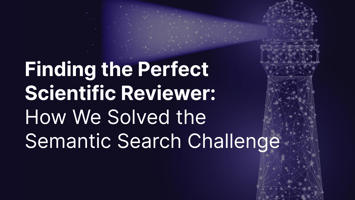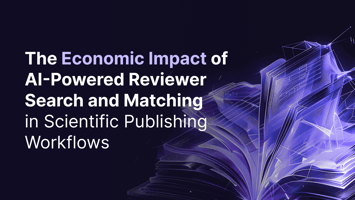By Vsevolod Solovyov, CTO & Co-founder of Prophy
AI-Powered Peer Review: Enhancing Scientific Publishing Quality
By Oleg Ruchayskiy, CEO of Prophy
The peer review process is under unprecedented pressure. With over 3 million new research articles published annually, finding qualified reviewers has become increasingly difficult. Journal editors report that locating reviewers is time-consuming, invitation acceptance rates are low, and many reviewers feel they lack sufficient expertise for their assigned manuscripts.
These challenges threaten a cornerstone of scientific integrity that researchers themselves value highly. Recent surveys show that 90% of researchers believe peer review improves the quality of research papers, and 85% agree that without it, there would be no control in scientific communication. Yet despite this consensus on its importance, the process needs refinement. There's a solution transforming how publishers and funding agencies approach peer review: AI-powered expert matching.
Why Traditional Peer Review Is Struggling
Publishers and funding agencies face several critical challenges in the current peer review landscape:
- Finding truly relevant experts is time-consuming and often ineffective
- Low acceptance rates from potential reviewers delay publication timelines
- Undisclosed conflicts of interest threaten the integrity of evaluations
- Manual processes cannot efficiently handle the volume of submissions
- Limited reviewer pools lead to overreliance on the same experts
- Lack of diversity in editorial boards perpetuates potential bias
- Reliability and transparency issues with peer review systems in various research fields
While many researchers report satisfaction with peer review overall, they want to improve the process rather than replace it. Research confirms what's at stake. A Royal Society Open Science study examining 27,467 manuscripts found that quality peer review significantly improved methodological rigor across both initially strong and weak submissions¹. Yet achieving this quality consistently remains elusive under traditional approaches.
How AI-Powered Matching Transforms Peer Review
Many scientists find published research trustworthy, but some have doubts about the quality of research outputs. Advanced AI systems now analyze scientific articles across physical sciences, engineering, life sciences, medicine, economics, and social sciences to reimagine peer review in three fundamental ways:
1. Precision Expertise Matching
Unlike conventional approaches that rely on broad subject categorization, AI algorithms evaluate semantic and bibliographic similarities between manuscripts and potential reviewers' publication records. This creates detailed expertise fingerprints across researcher profiles.
This precision matching:
- Identifies reviewers with exactly relevant expertise, even in interdisciplinary areas
- Maintains an up-to-date understanding of researchers' evolving specializations
- Considers researchers' academic experience to include both established and emerging voices
- Creates a significantly larger, well-organized pool of qualified experts
Result: Higher reviewer acceptance rates as experts receive manuscripts truly aligned with their specific knowledge.
2. Automated Conflict Detection
Conflicts of interest undermine peer review integrity. Modern AI systems analyze co-authorship and co-affiliation patterns to:
- Immediately flag potential conflicts during reviewer selection
- Examine complex relationships that might be missed in manual screening
- Reduce reputation risks from undisclosed conflicts
- Save editors countless hours previously spent on manual verification
Result: Enhanced impartiality and trustworthiness in the review process.
3. Diversity Amplification
Editorial bias remains a significant concern in scientific publishing. Studies have identified multiple bias factors including nationality, language, specialty, and gender that can affect peer review outcomes. AI-powered reviewer matching helps address these challenges by enabling searching by:
- Geography (ensuring global representation)
- Gender (incorporating diverse perspectives)
- Seniority (balancing established and emerging voices)
- Additional diversity metrics beyond traditional selections
Result: More diverse editorial boards and reviewer pools, bringing fresh perspectives to the evaluation process and reducing systematic biases.
Real Impact on Scientific Publishing Quality
The benefits of AI-powered matching are measurable across multiple dimensions:
- Higher reviewer acceptance rates: When potential reviewers receive relevant manuscript invitations matching their expertise, they're more likely to accept
- Faster review turnaround: By identifying willing and qualified reviewers more quickly, the overall publication timeline accelerates without sacrificing quality
- More constructive feedback: Reviewers with precise expertise provide more substantive, specific recommendations
- Enhanced error detection: Appropriate expert matching increases the likelihood of identifying methodological flaws, statistical errors, or incomplete analyses before publication
- Greater editorial diversity: More diverse reviewer pools reduce systemic bias in publication decisions
- Improved transparency: Research shows higher transparency in peer review is associated with better quality reviews as rated by authors
Seamless Integration for Maximum Efficiency
Beyond better matching, AI-powered systems transform editorial workflows by:
- Integrating with existing editorial platforms
- Providing user-friendly dashboards for monitoring the review process
- Allowing customizable search criteria for recurring needs
- Delivering real-time updates reflecting the latest research developments
This integration addresses the challenge of managing large reviewer pools efficiently while maintaining focus on quality assessment.
Balancing AI and Human Expertise
While AI dramatically improves the matching process, human judgment remains essential. Studies show reviewer characteristics like training in epidemiology and statistics positively affect review quality, but reviewer reliability can vary significantly. The most effective approach combines:
- AI-driven candidate selection based on objective metrics
- Editorial expertise in making final reviewer selections
- Clear communication of quality expectations to reviewers
- Recognition systems that acknowledge reviewer contributions
- Targeted reviewer training to improve consistency and quality
This balanced approach maintains the collaborative nature of scientific evaluation while leveraging technology to overcome traditional limitations.
The Future of Scientific Quality Assurance
The reimagining of peer review through AI-powered matching represents a fundamental advancement in scientific publishing quality. By ensuring that manuscripts connect with the most qualified experts, automatically detecting potential conflicts, and enabling greater diversity in evaluation, these systems address the core challenges that have limited traditional approaches.
As publishers adopt these technologies, the scientific community can expect more consistent, thorough, and constructive peer review—ultimately elevating the quality of published research and accelerating scientific progress.
References:
² Quality and Trust in Peer Review, Sense About Science Survey, 2019.
How has your experience with peer review changed in recent years? Share your perspectives in the comments below.
.png?width=337&height=96&name=Logo%20(1).png)





